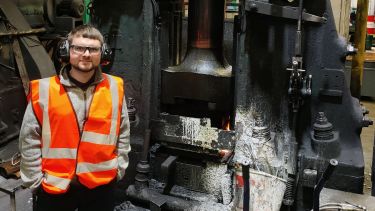Titanium alloys are an ideal candidate material for sub-sea components; able to resist both the large hydrostatic pressures and corrosive seawater. However, due to the inherent high costs of the extraction and processing of conventionally produced titanium, their use is limited with other high strength, but less corrosion-resistant, materials such as steel or nickel alloys being used instead. This project sets out to demonstrate an alternative production route by utilising recycled and/or surplus titanium through the FAST-forge (Field Assisted Sintering Technology followed by a one-step forging process) to allow titanium to compete with the current materials from a cost perspective.
I have over 50 years experience in forging and found FAST titanium to be the easiest material I’ve ever forged.
John Bull, Forger
W.H. Tildesley, Wolverhampton
Corrosion resistance is a key requirement for sub-sea offshore components such as a junction. Titanium alloys have excellent corrosion resistance, yet, due to their prohibitive high costs, these components are currently made from steels or nickel alloys. In this work we demonstrate a low-cost approach to produce such components from recycled/surplus material, which could be disruptive for the implementation of titanium alloys in to sub-sea components.
The FAST-forge method is both more economical and sustainable than traditional part production.
Waste streams such as out-of-spec additive manufacturing (AM) powders and cleaned machining swarf utilises a product that would otherwise be discarded whilst also reducing the production costs for titanium forging preforms.
Forging efficiency and tool wear is improved by up to 300% as a good die fill was achieved in four blow or less, did not require die lubricant and required lower forging temperatures than the existing steel/nickel options, reducing energy consumption and the need for furnace maintenance.
The FCT HP D 250 at the Royce Discovery Centre was used to produce the forging preforms via Field Assisted Sintering Technology (FAST), with the closed-die forging performed at W.H. Tildesley in Wolverhampton.
We believe die life is extended from 200-300, up to 1000 parts conservatively [by the FAST-forge process], in other words, increases die life by at least 300%
David Lunn
W.H. Tildesley, Wolverhampton

